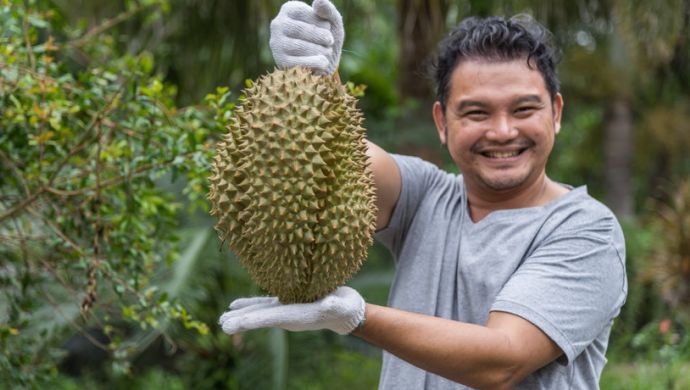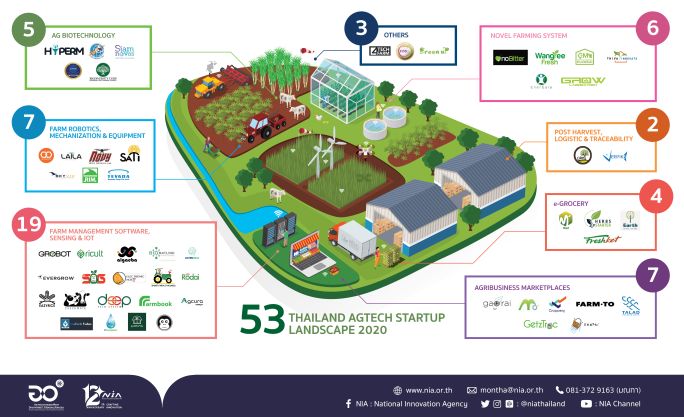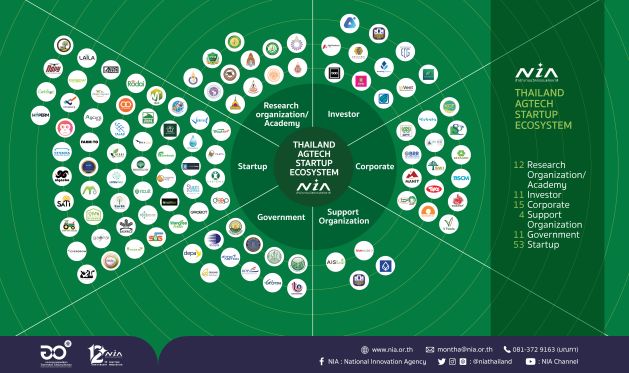
According to a white paper published by National Innovation Agency and Maejo University, up until 2019, agritech startups in Thailand raised a total of THB772 million (US$23 million). This number was raised by 41 companies in the market from the beginning of their operations.
Interestingly, the white paper found that 66.7 per cent of agritech startups in the market did not use any investment from external sources such as venture capital (VC), corporate venture capital), or angel investors. This is seen as a reflection of the local ecosystem still being in its initial phase, calling for the need for promotions and cooperation with all related sectors.
“In terms of the amount of investment, Thailand is categorised at the same level as its neighbouring countries such as Malaysia, Vietnam and Myanmar but much lower than those of Indonesia and Singapore,” explained a press statement.
“Technology investment is diversified in which farm management software, sensing and IoT are most invested whereas post-harvest handling, logistics and traceability are least invested. The amount of investment in novel farming technology ranked second in the country, similar to the global agritech investment trend. Nevertheless, biotechnology investment is in the sixth position of the country whereas, in the global ranking, investment in this technological category ranked first.”

Agritech startups in Thailand and its focus
The white paper also stated that there are 53 agritech startups in the country with an average business age of 4.7 years –these companies are developing farm management software, sensing, and IoT.
Also Read: Startup Thailand Marketplace: a gateway to new markets
These companies are divided into the following stages:
– 52.5 per cent is in the seed stage (selling and adjusting the product)
– 27.5 per cent in the pre-seed stage (testing the product)
– 20 per cent of them is in the growth stage (expanding customer base)
Most of the startups are located in Bangkok Metropolitan Region.
The next steps for agritech startups in Thailand
The white paper also looked at the solutions that can be taken in order to take the ecosystem forward. It divided the plan into four phases:
– Emergence, where few agritech startups are set up, having members of ecosystem working independently of each other
– Agglomeration with increasing numbers of ecosystem startups, having members start working together toward mutual benefit
– Globalisation where an exchange of resources, such as capital, personnel and technology, with other countries is sustained
– Harmonisation where members of ecosystem work in a synchronised manner, attributing to an exponential increase of ecosystem value
“The next step of NIA working strategy is to bridge agritech startup with all related sectors to achieve cooperation through the four-approach mechanisms which are increasing quantity, improving quality, expanding diversity and inducing collaboration. This will enhance the quality of Thai agritech startup toward sustainable agriculture transformation,” said Dr. Pun-arj Chairatana, Director of NIA.
This is especially more urgent since, during the COVID-19 pandemic, the agriculture sector in Thailand is “impacted less” compared to other industries. It also had the tendency to “recover faster” from the negative impacts.

A map of the agritech startup ecosystem in Thailand
The white paper also revealed the profiles of agritech startup founders in the market:
– Most of them hold an undergraduate degree with at least one staff who studied the agriculture-related subject
– They are mostly aged 25 to 50
– 82.5 per cent of founders enter the agritech sector with the desire to create an impact on society in addition to making profits
—
Image Credit: pongmoji
The post Agritech ecosystem in Thailand: More than 60 per cent of startups have not raised external funding appeared first on e27.

